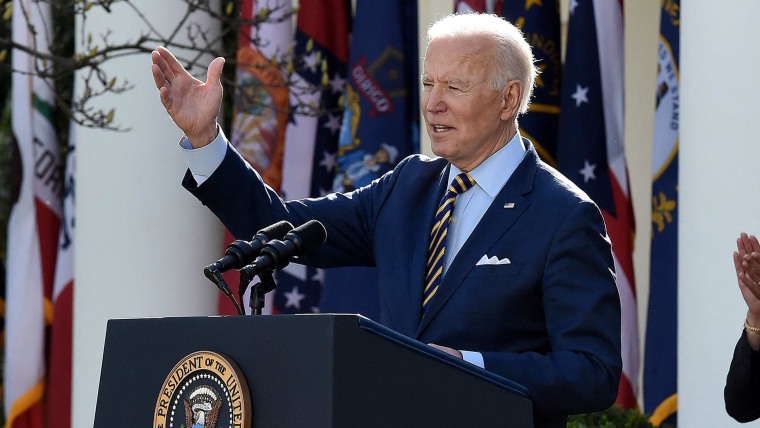President Joe Biden took a victory lap Friday after the passage of the $1.9 trillion American Rescue Plan, and perhaps one of the most significant elements of the law is the massive changes it will make to health care coverage in the United States — the largest since the passage of the Affordable Care Act under the Obama administration.
“For the first time in a long time this bill puts working people in this nation first,” Biden said in a speech in the Rose Garden.
Earlier Friday, senior administration officials, who spoke on the condition of anonymity in order to freely discuss the specifics of the legislation, elaborated on how the plan will expand health care coverage as well as lower costs by boosting subsidies for those who buy insurance through the exchanges created by the Affordable Care Act — sometimes also called Obamacare.
Americans will be able to access those subsidies on the federal exchange beginning April 1.
Key provisions of the law require that Americans pay no more than 8.5 percent of their income on health insurance premiums and provide a larger tax credit to 9 million people who receive financial assistance, helping them afford coverage through the marketplace. Those whose earnings are 400 percent of the federal poverty level, which ekes out to slightly more than $51,500 a year, will be able to receive aid to purchase affordable health care coverage.
The Biden administration estimates that, through cost-sharing, Obamacare premiums will decrease on average by $50 per month. One administration official emphasized that four out of five enrollees “will be able to purchase a plan for $10 or less per month” and said it could be significant for the 14.9 million people who are uninsured in the United States.
Through the American Rescue Plan, the administration officials said that uninsured couples earning more than $70,000 could save $1,000 per month on their monthly premiums, a family of four making $90,000 will see premiums decrease by $200 per month and an individual making $19,000 will not have to pay a monthly premium.
The law makes it so that those who buy their own insurance will automatically become eligible for the new tax credits beginning April 1. Those who sign up for health care coverage after April 1 will automatically be enrolled, but anyone who had a plan beginning prior to that date will have the to update their plan to lower their premiums.
More than 200,000 Americans have signed up for coverage since Biden opened up a special enrollment period on February 15. That period continues until May 15.
The administration officials stressed that individuals will have to sign up or update their plans to receive the savings, though they said there would also be an opportunity to recoup those subsidies come tax season.
Officials said that it was technologically challenging to automatically apply the subsidy, though they are attempting to find avenues to automate that later this year.
“The agency is going to be working tirelessly to implement these revisions, make sure that the American people know that they can find quality, affordable coverage on healthcare.gov,” one official said. “And that’s whether they are currently enrolled, whether they’re currently uninsured or unemployed.”
People in those states that have their own health insurance exchanges and don’t use healthcare.gov will still have access to those savings, but they will have to contact their states to get a better idea of their state’s timeline — which could differ.
The law also promises to give people who received at least one week of unemployment at any point in 2021 an opportunity to obtain health care coverage with a $0 premium, though it is expected that it will take longer to bring that on board because of the complexity of negotiating that with the states.
It is unclear how it could affect people who do not purchase their health insurance on the exchanges, and some are also concerned the subsidies are set to expire in two years if they are not approved by Congress — setting up a potentially huge election battle in 2022.
It is also unclear whether any states that haven’t expanded Medicaid through the Affordable Care Act will take up the Biden administration’s offer of covering a larger share of the program, a notable piece of the American Rescue Plan. Twelve states, all controlled by Republican legislatures and most by Republican governors, still have not adopted the provision, leaving millions without coverage.
The Biden administration is continuing to work with those states, an official said. Moreover, there is soon to be a massive outreach campaign to educate consumers on the changes and opportunities.
“March 23 is the 11th anniversary of the Affordable Care Act, and so I think you can expect to see a very big push from us,” one official noted.
Source: | This article originally belongs to Nbcnews.com












